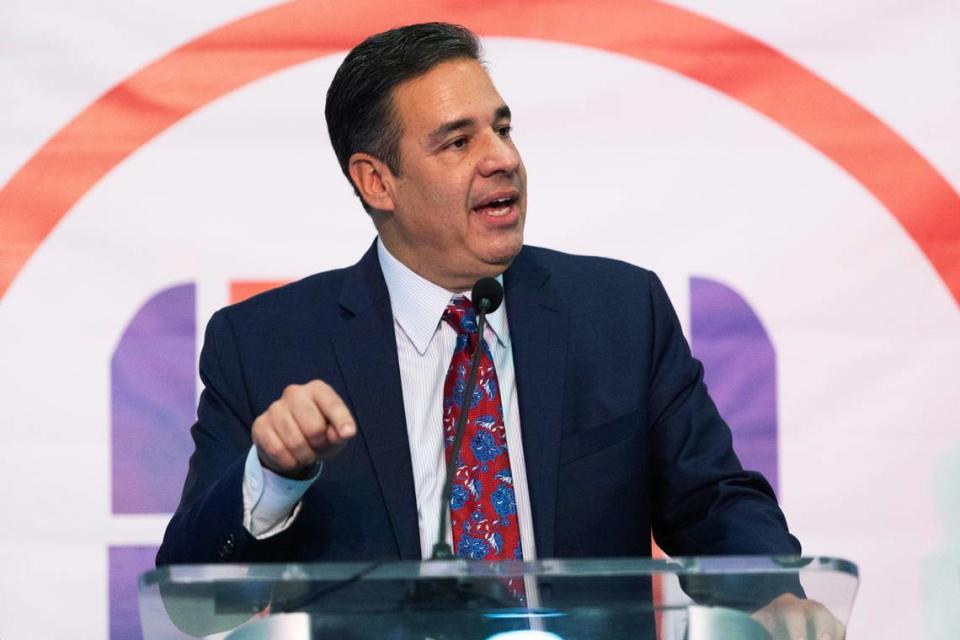Idaho attorney general’s speech on nuclear cleanup contained one striking misstep | Opinion

Attorney General Raúl Labrador made a striking statement at Tuesday’s celebration of the Idaho Cleanup Project’s successful transition of spent nuclear fuel from wet to dry storage.
“We should be ready to have a serious conversation about interim storage, and Idaho needs to lead this conversation,” Labrador said.
It takes a little background to understand how unexpected that statement was.
The U.S. Department of Energy has committed to removing all nuclear waste from Idaho, which has included everything from old lab equipment used to handle plutonium, to radioactive liquid held in underground tanks, to barrels of material that combust simply by being exposed to air.
Much of that waste can be sent to the Waste Isolation Pilot Project in New Mexico, but the old uranium fuel rods now in dry storage don’t have a destination.
The original plan was that those fuel rods would go to the Yucca Mountain Nuclear Waste Repository in Nevada, but that facility has never opened (and likely never will open). The idea of interim storage is to house waste in a facility until a permanent repository is available — at some unknowable date in the future.
Was Labrador talking about keeping nuclear waste in Idaho beyond the terms of the 1995 Settlement Agreement? He fell short of saying it outright but also didn’t close the door to the idea either when I asked him.
“We just are having a discussion about what we’re going to do,” Labrador said in an interview after the event. “Obviously, when the agreement was signed many years ago, we had a plan for where the fuel was going to wind up. We don’t know where it’s going to end up now, so we need to start discussing whether Idaho needs to be part of that conversation.”
Labrador emphasized that he didn’t have a specific proposal, that he was just proposing a conversation. But that conversation would be about abandoning the core commitment negotiated in the 1995 Settlement Agreement: that the federal government would get nuclear waste out of Idaho on a specified timeline.
This is a commitment Idaho already has. Reexamining it would be a significant concession. And if Idaho were to have an interim storage site, waste could remain here for decades. The federal government has attempted to open one permanent repository for 20 years without success. It is highly uncertain when or if a permanent facility will exist.
At the same time, Labrador did not show the level of knowledge about waste cleanup that I am used to seeing from the attorney general.
A principal focus of the Attorney General’s Office has long been the status of the Integrated Waste Treatment Unit. That facility is meant to turn 900,000 gallons of liquid radioactive waste into a solid that can be shipped out of the state, but it uses novel technology and has had a history of false starts, which has caused the DOE to miss some deadlines laid out in the 1995 Settlement Agreement.
If you asked former Attorney General Lawrence Wasden about how he was feeling about progress at IWTU, as I did many times, he recited all the latest developments from memory and would clearly communicate his expectations.
I asked Labrador the same question.
“There’s different deadlines, different things, and we could always do better at different things. But they’re showing that they (DOE) want to perform, and they want to reach their goals,” Labrador responded.
That is not the level of clarity I’m accustomed to. But Labrador has been on the job only a few months, so it’s not at all surprising that he would have less background knowledge than Wasden.
But a mixture of spotty background knowledge and a tendency to shoot for big, headline-grabbing moves could get Idaho into real trouble.
Labrador has made such flashy moves in the past. In 2012, he voted in favor of the McClintock Amendment, which would have gutted funding for nuclear energy, including most of what Idaho National Laboratory does.
There was no real risk of the amendment passing, however. It failed by a nearly 3-to-1 margin, so Labrador could cast his vote purely for the purpose of making a political statement. You can do things like that in Congress.
But this is not Congress; this is serious.
Let’s hope Labrador takes a breath and spends a bit more time getting to know the system before he proposes major overhauls.
Idaho’s nuclear waste cleanup is not a test of his politics. It’s a test of his competence.
Bryan Clark is an opinion writer for the Idaho Statesman based in eastern Idaho.

